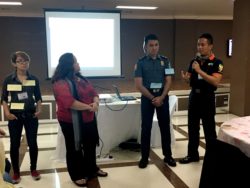Addressing Gender and Social Inclusion Considerations in Disaster Risk Reduction Management and Climate Change Adaptation Workshop in Batangas City, Philippines
The United States Agency for International Development (USAID) Strengthening Urban Resilience for Growth with Equity (SURGE) Project held a three-day workshop on disaster risk reduction management and climate change adaptation from February 20–22 in Batangas City, Philippines. As part of this workshop, Banyan Global led a two-hour training on critical gender equality and social inclusion issues in disaster risk reduction management, vulnerability assessments, and climate change adaptation planning.
The session kicked off with a series of interactive and participatory exercises for workshop participants on different physical and mental vulnerabilities that men and women typically experience in disaster settings. Participants were then asked to discuss gender differences in adaptive and coping strategies used by men and women.

SURGE’s Gender and Social Inclusion Specialist, Ms. Gichelle Cruz, leads workshop participants in an interactive exercise to better understand different vulnerabilities of women and men in disaster settings.
The SURGE Project Gender and Social Inclusion Specialist gave a presentation that highlighted why it is important to address gender and social inclusion considerations in disaster risk reduction and vulnerability assessments, framing the issue within Philippines legal frameworks, including national climate change policies. She then highlighted key questions and analytical techniques to assess and address differences in vulnerabilities and adaptive capacity. Participants were given a few key tools to better examine and understand social inclusion and gender-related differences in vulnerabilities and women’s specific roles in disaster risk reduction management cycles, including mitigation, preparedness, response, and recovery/reintegration. The Banyan Global SURGE Gender and Social Inclusion (GESI) Team then introduced a draft tool developed by the project on GESI integration tools for vulnerability assessment and disaster risk reduction management planning. Participants learned how to use this tool as part of ongoing disaster risk reduction management planning at numerous stages.
Messages and learning on gender equality and social inclusion were reinforced and reiterated throughout the three-day workshop, with workshop participants frequently being asked to consider GESI implications in participatory activities.
“When we prepare our reports, we don’t specify the gender, or if the individual is a child or a person with disability,” said Senior Fire Officer 1 Carlo I. Castro, Chief of Operations of the Bureau of Fire Protection in Batangas City. “Now I realize we have to have specific data on our constituents.”
Participants from different municipal offices across Batangas City had multiple opportunities to practice and apply key learnings from the gender and social inclusion session as part of skill-building and planning over the course of the workshop.
